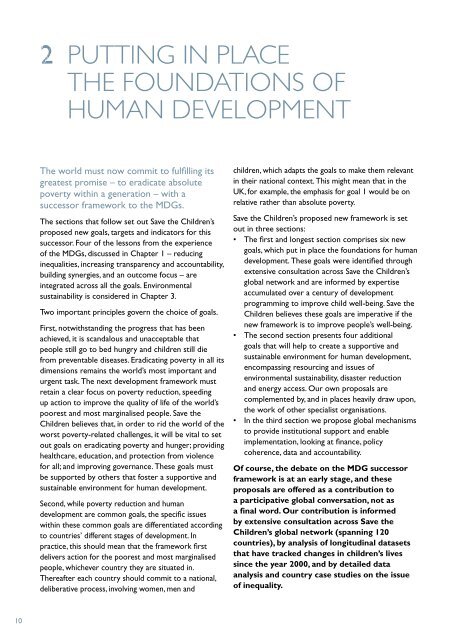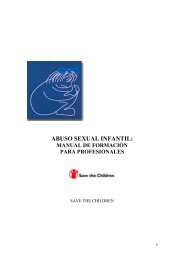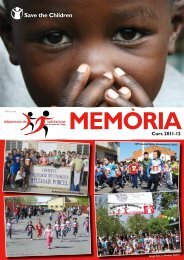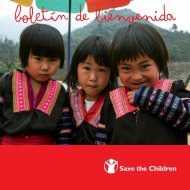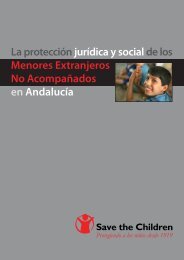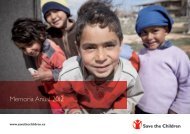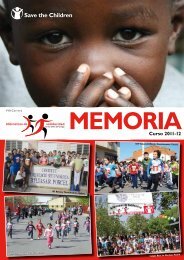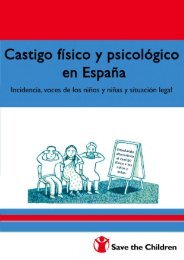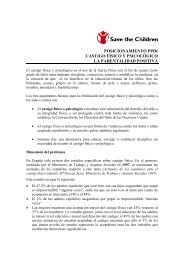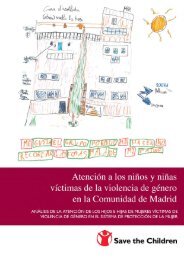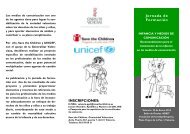ENDING poverty - Save the Children
ENDING poverty - Save the Children
ENDING poverty - Save the Children
Create successful ePaper yourself
Turn your PDF publications into a flip-book with our unique Google optimized e-Paper software.
2 PUTTING IN PLACE<br />
THE FOUNDATIONS OF<br />
HUMAN DEVELOPMENT<br />
The world must now commit to fulfilling its<br />
greatest promise – to eradicate absolute<br />
<strong>poverty</strong> within a generation – with a<br />
successor framework to <strong>the</strong> MDGs.<br />
The sections that follow set out <strong>Save</strong> <strong>the</strong> <strong>Children</strong>’s<br />
proposed new goals, targets and indicators for this<br />
successor. Four of <strong>the</strong> lessons from <strong>the</strong> experience<br />
of <strong>the</strong> MDGs, discussed in Chapter 1 – reducing<br />
inequalities, increasing transparency and accountability,<br />
building synergies, and an outcome focus – are<br />
integrated across all <strong>the</strong> goals. Environmental<br />
sustainability is considered in Chapter 3.<br />
Two important principles govern <strong>the</strong> choice of goals.<br />
First, notwithstanding <strong>the</strong> progress that has been<br />
achieved, it is scandalous and unacceptable that<br />
people still go to bed hungry and children still die<br />
from preventable diseases. Eradicating <strong>poverty</strong> in all its<br />
dimensions remains <strong>the</strong> world’s most important and<br />
urgent task. The next development framework must<br />
retain a clear focus on <strong>poverty</strong> reduction, speeding<br />
up action to improve <strong>the</strong> quality of life of <strong>the</strong> world’s<br />
poorest and most marginalised people. <strong>Save</strong> <strong>the</strong><br />
<strong>Children</strong> believes that, in order to rid <strong>the</strong> world of <strong>the</strong><br />
worst <strong>poverty</strong>-related challenges, it will be vital to set<br />
out goals on eradicating <strong>poverty</strong> and hunger; providing<br />
healthcare, education, and protection from violence<br />
for all; and improving governance. These goals must<br />
be supported by o<strong>the</strong>rs that foster a supportive and<br />
sustainable environment for human development.<br />
Second, while <strong>poverty</strong> reduction and human<br />
development are common goals, <strong>the</strong> specific issues<br />
within <strong>the</strong>se common goals are differentiated according<br />
to countries’ different stages of development. In<br />
practice, this should mean that <strong>the</strong> framework first<br />
delivers action for <strong>the</strong> poorest and most marginalised<br />
people, whichever country <strong>the</strong>y are situated in.<br />
Thereafter each country should commit to a national,<br />
deliberative process, involving women, men and<br />
children, which adapts <strong>the</strong> goals to make <strong>the</strong>m relevant<br />
in <strong>the</strong>ir national context. This might mean that in <strong>the</strong><br />
UK, for example, <strong>the</strong> emphasis for goal 1 would be on<br />
relative ra<strong>the</strong>r than absolute <strong>poverty</strong>.<br />
<strong>Save</strong> <strong>the</strong> <strong>Children</strong>’s proposed new framework is set<br />
out in three sections:<br />
<br />
goals, which put in place <strong>the</strong> foundations for human<br />
development. These goals were identified through<br />
extensive consultation across <strong>Save</strong> <strong>the</strong> <strong>Children</strong>’s<br />
global network and are informed by expertise<br />
accumulated over a century of development<br />
programming to improve child well-being. <strong>Save</strong> <strong>the</strong><br />
<strong>Children</strong> believes <strong>the</strong>se goals are imperative if <strong>the</strong><br />
new framework is to improve people’s well-being.<br />
<br />
goals that will help to create a supportive and<br />
sustainable environment for human development,<br />
encompassing resourcing and issues of<br />
environmental sustainability, disaster reduction<br />
and energy access. Our own proposals are<br />
complemented by, and in places heavily draw upon,<br />
<strong>the</strong> work of o<strong>the</strong>r specialist organisations.<br />
<br />
to provide institutional support and enable<br />
implementation, looking at finance, policy<br />
coherence, data and accountability.<br />
Of course, <strong>the</strong> debate on <strong>the</strong> MDG successor<br />
framework is at an early stage, and <strong>the</strong>se<br />
proposals are offered as a contribution to<br />
a participative global conversation, not as<br />
a final word. Our contribution is informed<br />
by extensive consultation across <strong>Save</strong> <strong>the</strong><br />
<strong>Children</strong>’s global network (spanning 120<br />
countries), by analysis of longitudinal datasets<br />
that have tracked changes in children’s lives<br />
since <strong>the</strong> year 2000, and by detailed data<br />
analysis and country case studies on <strong>the</strong> issue<br />
of inequality.<br />
10


